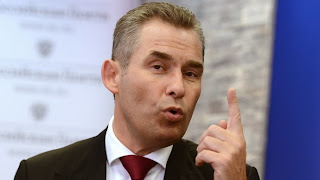Russia
Russian children’s rights commissioner: Only Italy can adopt Russian children
 |
| Pavel Astakhov via Russia Today (RT) News |
By Brody Levesque | MOSCOW -- Russia's Presidential Commissioner for Children's Rights, Pavel Astakhov, told Russian media outlets Friday that only Italy had an active bilateral adoptions agreement giving its citizens the right to adopt Russian children. Astakhov added that the Russian government will not allow adoptions to families in countries that do not have bilateral agreements on the issue with the Russian Federation. He added that he saw no change to this policy.
“This is not our fate. We have national adoption as a priority,” he said.
Astakhov said that currently only Italy matches the two main criteria for adoption of Russian children – a bilateral agreement with the Russian Federation and a ban on same-sex marriage.
Astakhov's remarks come on the heels of an inquiry by the European Court of Human Rights to Russian Foreign Minister Sergei Lavrov, acting on behalf of 23 American families who were denied the right to complete adoptions of their Russian children because of the Dima Yakovlev Law.
That law bans adoptions by American couples was passed last December by the federal Parliament and took effect January 1, 2013. It is informally named after a Russian orphan adopted by a family from Purcellville, Virginia, who died of a heat stroke after being left in a parked car for nine hours.
The law was also passed in partial retaliation for the American Magnitsky Act, which imposes a visa ban and asset freezes on Russians implicated in human rights violations.
A Russian Foreign Ministry diplomat for Human Rights and the Rule of Law, Konstantin Dolgov, had answered the European Court's inquiry last week saying that many of the children asked about had either been adopted by Russian citizens or returned to their biological parents.
Astakhov noted that Russia previously had a bilateral adoption agreements with the United States, but the agreement with the United States was canceled after Russian officials repeatedly complained that American authorities had barred Russian diplomats and law enforcement personnel from investigating alleged violations of the adopted children’s rights – ranging from cruel treatment to sometimes manslaughter, brought about by the Yakovlev case in particular.
Astakhov added that Russia’s problems with the United States were unique to that nation.
“Such cases of pedophilia, violence and brutality as we have in America, we have nothing like that anywhere else,” he said.
An earlier signed agreement with France was was revoked after it officially legalised same-sex marriages earlier this year.
Astakhov said Russia would provide the children with the right to have a family but would not be held accountable before the European Court of Human Rights for the upholding of that right.
Croatia
Despite referendum to ban same-sex marriage, Croatian government moves to institute civil unions
ZAGREB -- Although the outcome of Sunday's national referendum will effectively ban same-sex marriage in this predominantly Catholic Balkan country, a spokesperson for the government of Prime Minister Zoran Milanovic said Monday that officials plan to offer legislation to Parliament which would give same-sex couples many of the legal rights currently afforded to heterosexual couples. This measure would include hospital visitation and inheritance rights, but does not include the right to adopt children.
The referendum had asked whether the constitution should be amended to define marriage as "the union between a man and a woman," and was heavily supported by the Catholic Church. Almost 90% of Croatia's population of 4.4 million are nominally Roman Catholics.
The referendum also received support from 104 members of Croatia's 151-seat parliament.
Croatian President Ivo Josipovic said he was disappointed but not surprised by the outcome of the vote. "The referendum result must not be the reason for new divisions," he warned.
The government, human rights groups and prominent public figures had all spoken out against the referendum, urging people to vote no.
Prime Minister Milanovic warned that the referendum threatened people's right to happiness and choice. Milanovic told European media outlets that he regretted that the referendum had even been held. “I think it did not make us any better, smarter or prettier,” he said.
The referendum pitted conservative groups and the church against the government and human rights activists. Politcal Analysts said that the conservative groups were also able to tap into growing popular disenchantment with the European Union, which Croatia joined in July. Many Croats blame the union, fairly or unfairly, for the nation’s economic woes.
In a New York Times article Monday, Stephen Bartulica, a professor of political philosophy at the Catholic University of Croatia in Zagreb, and a leading campaigner on the yes side, said that the union was being conflated in Croatia with creeping secularism. “There is a feeling that gay marriage and adoption by gays was on the agenda, and this vote was an attempt to show that there is strong opposition to this,” he said.
The EU however, took no official position on the referendum.
The results of the vote approved changes to Croatia's constitution to define marriage as a union between a man and a woman. A government spokesperson acknowledged Monday that the constitution would now have to be changed accordingly.
According to the LGBTQ equality rights group Liga LGBTI, Croatia is ranked 13th out of 49 European countries in its treatment of LGBTQ people. Numerous LGBTQI organizations are active in the country, police and police cadets are now instructed about LGBTQ equality rights rights, and this past June, Prime Minister Milanovic's wife took part in Zagreb's 12th annual pride parade.
A spokesperson for the coalition against Sunday's referendum, Citizens Vote Against, voiced her concerns that the referendum will "open the gate wide to further constitutional changes" and that "human rights in Croatia will be threatened in the long term." Jelena Berkovic said adding,"We want to protect and advance human rights in Croatia. And that means above all protecting the rights of minorities."






















0 comments:
Post a Comment